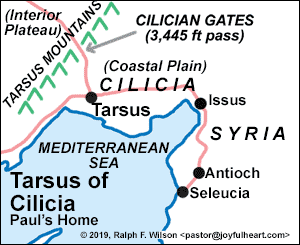Free E-Mail
Bible Studies
Beginning the Journey (for new Christians). en Español
Old Testament
Abraham
Jacob
Moses
Joshua
Gideon
David, Life of
Elijah
Psalms
Solomon
Songs of Ascent (Ps 120-135)
Isaiah
Advent/Messianic Scriptures
Daniel
Rebuild & Renew: Post-Exilic Books
Gospels
Christmas Incarnation
(Mt, Lk)
Sermon on the Mount
(Mt 5-7)
Mark
Luke's
Gospel
John's Gospel
7 Last Words of Christ
Parables
Jesus and the Kingdom
Resurrection
Apostle Peter
Acts
The Early Church
(Acts 1-12)
Apostle Paul
(Acts 12-28)
Paul's Epistles
Christ Powered Life (Rom 5-8)
1 Corinthians
2 Corinthians
Galatians
Ephesians
Vision for Church
(Eph)
Philippians
Colossians,
Philemon
1
& 2 Thessalonians
1 & 2 Timothy,
Titus
General Epistles
Hebrews
James
1 Peter
2 Peter, Jude
1, 2, and 3 John
Revelation
Revelation
Conquering Lamb of Revelation
Topical
Glorious Kingdom, The
Grace
Great Prayers
Holy Spirit, Disciple's Guide
Humility
Lamb of God
Listening for God's Voice
Lord's Supper
Names of God
Names of Jesus
Christian Art
About Us
Podcasts
Contact Us
Dr. Wilson's Books
Donations
Watercolors
Sitemap
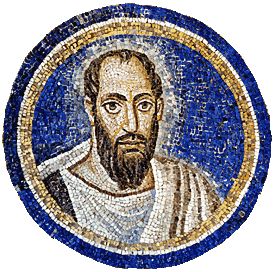 'Apostle Paul' (494-495 AD), ceiling mosaic, Archiepiscopal Chapel of St. Andrew (oratory), Ravenna, Italy. |
In the last two lessons we've been examining Stephen's death and the persecution that scattered the believers and prompted evangelism by Christians like Philip. In this lesson we'll focus on the conversion of Saul of Tarsus and Peter's amazing ministry in Joppa and Caesarea.
7.1 The Conversion of Saul (Acts 9:1-31)
As Stephen is being stoned, Saul of Tarsus is holding the garments of those throwing the stones that kill him. Now Saul spearheads a vicious campaign of suppression of this new sect that preached Jesus as Messiah.
One small glitch in the persecution plan emerges, however. Saul, leader of the campaign, meets Jesus on the Road to Damascus.
In this lesson we'll rehearse the story of Saul's conversion as told by Luke. However, since I've covered this material in much greater detail in my study of Apostle Paul: Passionate Discipleship (JesusWalk Publications, 2020), I'll refer you there for the background and comparisons with Paul's own accounts of his conversion later in Acts.
Saul of Tarsus
|
|
"1 Meanwhile, Saul was still breathing out murderous threats against the Lord's disciples. He went to the high priest 2 and asked him for letters to the synagogues in Damascus, so that if he found any there who belonged to the Way, whether men or women, he might take them as prisoners to Jerusalem." (Acts 9:1-2)
As mentioned in Lesson 6.1, each local synagogue had a sanhedrin or court that had authority to discipline its own members with up to 40 lashes, less one. The Great Sanhedrin in Jerusalem had authority over all Jews, granted by the Romans, who tended to let subject peoples govern themselves under their own laws, so long as they didn't conflict with Roman occupation. Saul has obtained authorization from the high priest, who presides over the Great Sanhedrin and Jews in general, to direct the synagogues in Damascus to deliver over members of the Jesus Sect among them to Saul. Then he will arrest and transport them to Jerusalem for trial before the Great Sanhedrin. In Jerusalem, he is confident that Jesus-followers will be condemned with all strictness and punished to the maximum allowed.
Damascus, Syria
Damascus, the capital of modern Syria, is an ancient city, continuously occupied from at least 2,000 BC. Dominated for a short period by Israel (about 1000-930 BC), the area has fallen to various overlords -- Hittite, Aramean, Assyrian, Babylonian, Persian, and Seleucids (Greeks). It served as a major trade center. Until Antioch was established in about 350 BC, it had been the chief city of Syria. The Romans conquered Syria in 65 BC and administered it under a Nabatean governor. At the time of Saul's conversion Damascus was a free city, minting its own money.363
Saul is almost to his destination. Depending on the route he takes, Damascus is 200 miles (320 kilometers), more or less, from Jerusalem, taking up to two weeks of travel. He journeys with a retinue of traveling companions that may include some temple guards to effect the arrest of the prisoners.
"3 As he neared Damascus on his journey, suddenly a light from heaven flashed around him. 4 He fell to the ground and heard a voice say to him, 'Saul, Saul, why do you persecute me?'
5 "Who are you, Lord?" Saul asked.
'I am Jesus, whom you are persecuting,' he replied. 6 'Now get up and go into the city, and you will be told what you must do.'
7 The men traveling with Saul stood there speechless; they heard the sound but did not see anyone. 8 Saul got up from the ground, but when he opened his eyes he could see nothing. So they led him by the hand into Damascus. 9 For three days he was blind, and did not eat or drink anything." (Acts 9:3-9)
I am struck by the Lord's words: "I am Jesus, whom you are persecuting" (Acts 8:5b). Paul thinks he is persecuting the misled followers of a failed Messiah-claimant. But he is actually persecuting Jesus himself. The relationship between Jesus and his Church is powerful! In Jesus' Parable of the Sheep and the Goats Jesus asserts that acts of mercy done to any in need are done directly to him.
"I tell you the truth, whatever you did for one of the least of these brothers of mine, you did for me." (Matthew 25:40)
Remember when Ananias and Sapphira lie to Peter, leader of the church, and are accused of lying to the Holy Spirit? (Acts 5:3, 5) How is this? "We are members of his body" (Ephesians 5:30). The ties of Jesus to his Church are much more powerful than we can imagine. Paul compares them to that of husband to wife (Ephesians 5:25-33). Examine 1 Corinthians 3:8-17 to see the reverence in which we should hold Christ's Church, there termed, "God's temple."
Q1. (Acts 9:4-5) Why is persecuting the Church the same
as persecuting Jesus himself? What is the bond between Jesus and his Church? Why
must we show reverence toward Christ's Church and not disparage it?
https://www.joyfulheart.com/forums/topic/2061-q1-jesus-body/
Saul has been knocked from his horse, blinded by a great light, seen Christ appear to him, been rebuked by the Lord, and called to a mighty ministry -- all in the space of a very few minutes. Now Saul is trying to process what has happened.
He has been going "full steam" in one direction. Now he is jerked to a full-stop, and turned in an entirely new direction. If you've ever had this happen in some arena of your life, you know that it takes adjustment. Saul is alone with his thoughts, working through his repentance and his new faith for three days before Jesus sends someone to him. It takes that long before he is ready.
Ananias, the Obedient Servant (Acts 9:10-16)
" 10 In Damascus there was a disciple named Ananias. The Lord called to him in a vision, 'Ananias!'
'Yes, Lord,' he answered.
11 The Lord told him, 'Go to the house of Judas on Straight Street and ask for a man from Tarsus named Saul, for he is praying. 12 In a vision he has seen a man named Ananias come and place his hands on him to restore his sight.'" (Acts 9:10-12)
Ananias is a Hebrew name meaning "Yahweh is gracious." The form commonly used in the Old Testament is "Hananiah." Ananias seems to have been a Jewish native of Damascus, since he speaks of having heard reports of the persecution in Jerusalem, rather than of being an eyewitness to these events (Acts 9:13-14). He doesn't seem to be a leader, but rather is identified as a regular "disciple" who is part of the newly formed Christian community in Damascus. In Ananias, we see God using "nobodies" just like you and me.
The Lord Jesus himself appears to Ananias in a vision (Acts 9:17b) and calls him by name. He responds, "Here I am, Lord," which is another way of saying, "Yes, sir, ready for duty, sir." Then Jesus tells him to go to a particular street and house to a man named Saul.
"13 'Lord,' Ananias answered, 'I have heard many reports about this man and all the harm he has done to your saints in Jerusalem. 14 And he has come here with authority from the chief priests to arrest all who call on your name.'" (Acts 9:13-14)
Ananias responds by informing Jesus about Saul's reputation and intent -- as if Jesus hasn't heard the reports. I'm always fascinated that Ananias argues with the Lord, presumes to tell the Lord that his instructions must be wrong. We smile at Ananias, but how often do we resist what God is saying to us? Our vision is so limited! Our hubris to correct God himself is so presumptuous! God is so gracious and patient in dealing with us. "Humble yourself in the eyes of the Lord, and he will lift you up," O man.
Jesus ignores Ananias, but explains briefly
"Go, for he is a chosen instrument364 of mine to carry my name before the Gentiles and kings and the children of Israel. For I will show him how much he must suffer for the sake of my name." (Acts 9:15-16)
Jesus reveals to Ananias something about Saul's call -- though it is not Ananias's job to explain that call to Saul. Jesus has begun to call Saul directly from the time he is struck down (Acts 26:16-18).
Ananias Ministers to Saul (Acts 9:17-19a)
God has already shown Saul a vision of Ananias coming to him, so he is prepared for Ananias when he comes.
"17 Then Ananias went to the house and entered it. Placing his hands on Saul, he said, 'Brother Saul, the Lord -- Jesus, who appeared to you on the road as you were coming here -- has sent me so that you may see again and be filled with the Holy Spirit.' 18 Immediately, something like scales fell from Saul's eyes, and he could see again. He got up and was baptized, 19 and after taking some food, he regained his strength." (Acts 9:17-19a)
Ananias calls him "Brother Saul." Yes, he is a brother Jew. But Ananias recognizes that he is now a Christian brother, as well. Jesus has dealt with him. Jesus has saved him from a course directed by Satan, who wants to destroy Christ's work. And now, Jesus is preparing him for his next steps along this new Way, using Ananias to do so. Ananias lays his hands on Saul and Saul's blindness is healed instantly. Acts tells us that Saul is filled with the Holy Spirit -- though we're not told how this manifested itself. Saul is then baptized by Ananias, presumably in the name of Jesus, his new Lord.
Q2. (Acts 9:9-19) God seemed to initiate Saul's
conversion. How did God use Ananias in ministry to Saul? How important is
listening and obedience in ministry -- even when we don't understand? Are you
prepared if God were to call you to minister to a high-profile person in his
Kingdom?
https://www.joyfulheart.com/forums/topic/2062-q2-listening/
Saul in Damascus and Jerusalem (Acts 9:19b-25)
Saul doesn't waste any time. His zeal for the Lord prior to this has been misguided. But his zeal for his new-found Savior is white-hot.
"19b Saul spent several days with the disciples in Damascus. 20 At once he began to preach in the synagogues that Jesus is the Son of God. 21 All those who heard him were astonished and asked, 'Isn't he the man who raised havoc365 in Jerusalem among those who call on this name? And hasn't he come here to take them as prisoners to the chief priests?' 22 Yet Saul grew more and more powerful366 and baffled367 the Jews living in Damascus by proving that Jesus is the Christ." (Acts 9:19b-22)
The Jews can't seem to understand this sudden turn-around. This isn't just a one-time incident of a powerful testimony. Saul's influence and effectiveness seems to grow greater day by day.368 Since he is a Jerusalem-trained rabbi, he is able to prove by the Scriptures that Jesus is the promised Messiah of Israel.
And the Jews are baffled, confused, out of their depth. They can't seem to withstand the logic of his Scriptural proof.369
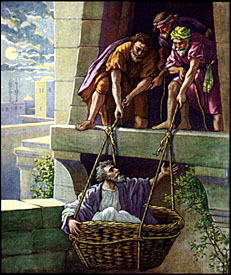 'Paul Let Down in a Basket' (artist unknown). |
Notice the time in verse 23 -- "after many days." This is a continuing revival within the city over an extended period of time. More and more Jews are turning to this Jesus. The leaders have to do something. And so, like the Jewish leaders in Jerusalem, they turn to death conspiracies.
"23 After many days had gone by, the Jews conspired to kill him, 24 but Saul learned of their plan. Day and night they kept close watch on the city gates in order to kill him. 25 But his followers took him by night and lowered him in a basket through an opening in the wall." (Acts 9:23-25)
Paul relates the story to the Corinthians also. It turns out that the Jews have conspired with the secular governor of the region also (2 Corinthians 11:32-33).
There is a time to stand and fight and a time to flee. By the time Saul learns of the conspiracy,370 the city gates are being watched, but God makes a way. I remember being thrilled by the story when I was a child and to this day. Gospel adventures!
Saul's Sojourn in Arabia (Galatians 1:15-17, 33-35 AD)
Luke's account doesn't mention it, but it must have been at this time that Saul spends time in Arabia.
"... I did not consult any man, nor did I go up to Jerusalem to see those who were apostles before I was, but I went immediately into Arabia and later returned to Damascus." (Galatians 1:16b-17)
During this time God seems to reveal much to Paul. It is a formative period in his life.371
Paul's Visit to Jerusalem (Galatians 1:18-24; Acts 9:26-30, 35 AD)
After time in the Arabian desert, Paul goes up to Jerusalem. Paul relates this to the Galatians in the first person:
"18 Then after three years, I went up to Jerusalem to get acquainted with Peter and stayed with him fifteen days. 19 I saw none of the other apostles -- only James, the Lord's brother." (Galatians 1:18-19)
Luke also describes this visit.
"26 When he came to Jerusalem, he tried to join the disciples, but they were all afraid of him, not believing that he really was a disciple. 27 But Barnabas took him and brought him to the apostles. He told them how Saul on his journey had seen the Lord and that the Lord had spoken to him, and how in Damascus he had preached fearlessly in the name of Jesus." (Acts 9:26-27)
Even three years after Paul's involvement in persecuting the church, the leaders are still afraid of him. Finally, Barnabas (later a colleague in ministry) befriends him and acts as an intermediary to introduce him to some apostles.
Paul Debates the Greek-Speaking Jews in Jerusalem (Acts 9:28-29)
But Paul's visit to Jerusalem isn't without incident.
"28 So Saul stayed with them and moved about freely in Jerusalem, speaking boldly in the name of the Lord. 29 He talked and debated with the Grecian Jews, but they tried to kill him." (Acts 9:28-29)
As you recall, the Grecian Jews from the Freedman's Synagogue are the ones who initiate the stoning of Stephen. So Paul goes back to his old friends in Jerusalem and tries to convince them that Jesus is the Messiah. Three words describe his dialog with them.
1. Speaking boldly. The verb suggests expressing oneself freely, speaking openly, boldly, fearlessly.[372] This action characterizes Paul's approach in synagogues on his missionary journeys also.373 Paul is fearless -- and tends to stir people up in the process.
2. Talking. The extremely common verb is laleō, "to speak."
3. Debating. The verb here is syzēteō, generally, "to carry on a discussion." But the meaning here is a couple of notches above that: "to contend with persistence for a point of view, dispute, debate, argue."374 The word is used in the Gospels to describe the Pharisees' debates with Jesus375 and Stephen's debate with the Jews before his martyrdom (Acts 6:8). Paul often used this approach in synagogues:
"As his custom was, Paul went into the synagogue, and on three Sabbath days he reasoned with them from the Scriptures, explaining and proving that the Christ had to suffer and rise from the dead." (Acts 17:2-3; see also Acts 18:4; 19:8)
Sometimes people tell us that "debating never won anyone to Christ." Not so. Sometimes it does. This describes the role of "apologetics" in conversion -- answering objections and making sure that opponents don't misunderstand or mischaracterize the Christian message. Don't be argumentative or quarrelsome (2 Timothy 2:24-26), but don't avoid a debate if it seems appropriate. It helps your opponents (and the hearers) test the strength of their arguments against the truth of Christ. Some are won to Jesus this way.
Q3. (Acts 9:28-29) We are not to be quarrelsome we know
(2 Timothy 2:24-26), but what is the role of debate and argument in evangelism?
What is the value of studying the Scriptures and the arguments for the divinity
of Jesus for leading people to Christ? Have you prepared yourself in this way?
https://www.joyfulheart.com/forums/topic/2063-q3-debate/
Saul Travels Home to Tarsus (Acts 9:29-30)
Saul seems to attract death threats.
"29 He talked and debated with the Grecian Jews, but they tried to kill him. 30 When the brothers learned of this, they took him down to Caesarea and sent him off to Tarsus." (Acts 9:29-30)
By now, the disciples in Jerusalem trust him. When his life is threatened, they escort him to the port city of Caesarea and put him on a ship to Tarsus, his home city, another strategic retreat. Sometimes we just need to be patient.
God uses this time in Tarsus to prepare Saul for a powerful mission throughout the Mediterranean. This is a time of revelations and visions (2 Corinthians 12:2-4), of intimacy with Christ, and probably evangelism in his home province.
Saul remains in Cilicia from about 35 to 46 AD, when Barnabas comes looking for him to help him in the ministry in Antioch as we'll see in Lesson 9 (Acts 11:25-26).
Peace in the Church (Acts 9:31)
Saul, once fierce persecutor now flaming evangelist, has sailed for Tarsus. Now things begin to settle down for a while.
"Then the church throughout Judea, Galilee and Samaria enjoyed a time of peace. It was strengthened; and encouraged by the Holy Spirit, it grew in numbers, living in the fear of the Lord." (Acts 9:31)
Now there is peace, that is, freedom from active persecution. But "peace" (Greek eirēnē) here probably goes beyond the Greek concept of the absence of war. Here, it seems intended to correspond to the Hebrew shalom, "welfare, health" and in the context of the Messiah, "messianic salvation."376
But peace doesn't mean absence of activity. Luke gives four indicators of what was happening during this period.377
1. Strengthening.378 The Greek word suggests house construction. It is a time of repair, strengthening, and rebuilding the "house" after a period of attack.
2. Encouragement by the Holy Spirit. The word can bear the idea of both encouragement and comfort. This word is also used to describe the Holy Spirit himself in John 14-16, translated variously "Comforter" (KJV), "Counselor" (NIV), "Advocate" (NRSV), "Helper" (ESV), Paraklete.379 After our battles, we need God's comfort and encouragement, a sense of well-being so we can heal and get strong again.
3. Growth in numbers.380 Sometimes we think that if the church isn't growing constantly it isn't healthy. No. Churches go through phases, cycles. The period of persecution was a time of retrenchment; now is a season of renewed growth. Sometimes a time of significant growth needs to be followed by a time of consolidation, before growing again. But if our church continues to decline in numbers over a period of time, it isn't usually a sign of health.
4. Humble piety. Walking or living "in the fear of the Lord" doesn't suggest terror or fear, but rather deep reverence, what I would characterize as a humble piety. It is possible to live in a kind of triumphalism. That's not bad at a time of victory, but constant triumphalism, disguised as faith, can keep us from humble trust in the Lord himself.
I find the first part of verse 31 interesting.
"Then the church throughout Judea, Galilee and Samaria enjoyed a time of peace." (Acts 9:31a)
Notice that the noun ekklēsia, "assembly, congregation, church," is in the singular, though it refers to perhaps scores of individual congregations scattered throughout the Holy Land during this period. Usually ekklēsia refers to an individual congregation, but sometimes it refers to the Church as a whole, to "the totality of Christians living and meeting in a particular locality or larger geographical area, but not necessarily limited to one meeting place,"381 and even more broadly, to "the global community of Christians, (universal) church,"382 Church with a capital "C".
I think it is also interesting that the region given here is "throughout Judea, Galilee, and Samaria." The church is now seen as spreading, no longer confined to Jerusalem. Incidentally, this is the only time churches in Galilee are mentioned in the New Testament.
7.2 The Ministry of Peter on the Plain of Sharon (Acts 9:32-43)
Now the spotlight of the Book of Acts moves again to Peter. It's interesting that Luke moves this spotlight from one leader to another as he seeks to tell the overall story of the growth of the early church.
- Peter (chapters 2-5)
- Stephen (chapters 6-7)
- Philip (chapter 8)
- Saul (chapter 9a)
Peter (chapters 9b-12)
Paul (Saul) and associates (chapters 13-28)
Peter's significant ministry had been highlighted in chapters 2-5. While Peter is based in Jerusalem, God has used him powerfully, in public meetings and helping people one on one.
"People brought the sick into the streets and laid them on beds and mats so that at least Peter's shadow might fall on some of them as he passed by. Crowds gathered also from the towns around Jerusalem, bringing their sick and those tormented by evil spirits, and all of them were healed." (Acts 5:15--16)
It almost sounds like Jesus' ministry of signs and wonders carried on in his lead apostle's ministry. Now Peter's ministry moves out from Jerusalem, travelling to local congregations in Judea and Samaria. Later we see him in Antioch (Galatians 2:11) and finally in Rome where he is martyred about 65 AD, the same year as Paul.
Healing of Aeneas (Acts 9:32-35)
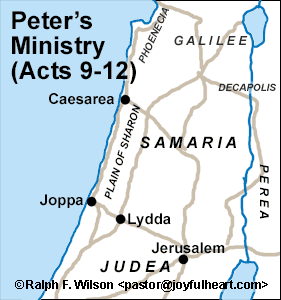 Peter's ministry in the Plain of Sharon. Larger map. |
"32 As Peter traveled383 about the country, he went to visit the saints in Lydda. 33 There he found a man named Aeneas, a paralytic who had been bedridden for eight years. 34 'Aeneas,' Peter said to him, 'Jesus Christ heals you. Get up and take care of your mat.' Immediately Aeneas got up." (Acts 9:32-34)
Lydda is the ancient Benjamite town of Lod. It lies at the intersection of the highway between Babylon and Egypt and the main road between Jerusalem and the port of Joppa. After the fall of Jerusalem in 70 AD, Lydda became noted as a seat of rabbinical learning.384 It is currently the site of Ben Gurion Airport, Israel's international air terminal.
There are "saints" in Lydda, one of whom is Aeneas, an old Greek name well-known from Virgil's epic poem about the survivors of the Trojan war. Aeneas is probably Jewish, but lives in an area that has a lot of Greeks and non-Jews. Aeneas is paralyzed, bedridden for the past eight years. Perhaps he's had a debilitating stroke or severe and ongoing illness.[385] Peter says to him in a voice of command:
"Jesus Christ heals386 you. Get up and take care of your mat." (Acts 9:34, NIV)
Peter didn't heal everyone; he must have had a word from the Lord to give such a command. His Master had said,
"I tell you the truth, the Son can do nothing by himself; he can do only what he sees his Father doing, because whatever the Father does the Son also does." (John 5:19, cf. 5:30)
Peter hears from the Lord and gives the command to heal. Suddenly, life changes for Aeneas. For eight years, others have been spreading his mat and helping him around. Now he can make his own bed.387 Hallelujah!
The result of this one healing is powerful.
"All those who lived in Lydda and Sharon saw him and turned388 to the Lord." (Acts 9:35)
Sharon refers to the beautiful coastal Plain of Sharon that extends about 30 miles (about 48 kilometers) from Joppa north to Caesarea. The lover in Song of Solomon hints at the beauty of its fields when she says, "I am a rose of Sharon, a lily of the valleys" (Song of Solomon 2:1). This is a semi-Gentile area,389 so a revival of this magnitude touches people who are scarcely Jewish, much less devout. Here is another example of the power of healing evangelism.
Dorcas the Giver (Acts 9:36, 39)
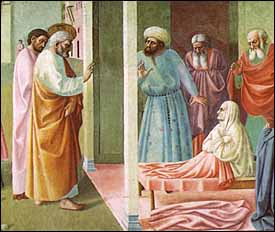 Tommaso Masolino da Panicale, detail of 'Resurrection of Tabitha' (1426-27), fresco, Brancacci Chapel, Church of Santa Maria del Carmine, Florence, Italy. Full fresco 255 x 162 cm. |
Joppa (which means "beautiful" in Hebrew) had been the port city for Jerusalem and this area for centuries. It is mentioned in Egyptian sources as early as the mid-15th century BC. During Peter's ministry, Joppa (as part of the Province of Judea) is under the direct control of the Roman prefect, Pontius Pilate (26-36 AD).390 I remember modern-day Jaffa as the site of a wonderful outdoor dinner with an Israeli family at a restaurant along the wharf in 1997.
Lydda is only about 17 miles (27 kilometers) inland from Joppa, a much larger and more important city. News of the healing of Aeneas reaches Joppa by the next day, leaving the city all abuzz.
"In Joppa there was a disciple named Tabitha (which, when translated, is Dorcas), who was always doing good and helping the poor." (Acts 9:36)
Tabitha (Aramaic Teḇîṯaʾ̄) means "gazelle." In Greek it is Dorcas (Dorkas). The gazelle is an antelope, with Gazella dorcas and Gazella arabica found in Syria and Palestine. It is small compared to a deer, about two feet high (60 cm) at the shoulder and about 3 feet long (1 meter). The gazelle is known for its speed (2 Samuel 2:18) and beauty, as evidenced in the Song of Solomon describing both the male lover as a gazelle, and his bride's breasts as "twin fawns of a gazelle" (Song of Solomon 2:9; 4:5; 7:3).
 Gazella dorcas, found in Syria and Palestine. |
Dorcas is a disciple, a follower of Jesus. She is also a woman of character, "always doing good" (NIV), literally, "full of good works."391 Some people focus on themselves; Dorcas focuses on the needs of others. She seems to be fairly affluent as she is always "helping the poor" (NIV) or doing "acts of charity,"392 probably donating food and money to the needy and caring for the sick and chronically ill. She is motivated by compassion, for that is the root of the Greek noun used here. She is also a seamstress, purchasing cloth and then sewing it into the clothing needed by the poorest of the poor. The widows of the congregation display "the robes393 and other clothing394 that Dorcas had made while she was still with them" (verse 39). Dorcas has been the inspiration for the tens of thousands of Dorcas Societies and sewing circles formed in congregations around the world to help the needy. No husband is mentioned, so she may be a widow. She is surely a pillar of the church in Joppa and is already sorely missed.
The Raising of Dorcas (Acts 9:37-42)
"37 About that time she became sick and died, and her body was washed and placed in an upstairs room. 38 Lydda was near Joppa; so when the disciples heard that Peter was in Lydda, they sent two men to him and urged him, 'Please come at once!'" (Acts 9:37-38)
Washing a body was common, but placing the body in an upstairs room was not. Immediate burials were the rule, since there was no way to keep the body from decomposition for any length of time. The disciples in Joppa must have believed that God would raise Dorcas from the dead, perhaps a word from the Lord. So they keep the body upstairs and send for Peter who is 17 miles up the road, a day's journey to reach Lydda and a day's journey to return to Joppa.
"39 Peter went with them, and when he arrived he was taken upstairs to the room. All the widows stood around him, crying and showing him the robes and other clothing that Dorcas had made while she was still with them." (Acts 9:39)
The upper room where Dorcas lies sounds very much like the situation at the death of Jairus's 12-year-old daughter, whom Peter had seen Jesus raise from the dead. The crying and mourning is similar; so is Peter's command to clear the room and his word to the deceased to get up (Mark 5:38-41).
"Peter sent them all out of the room; then he got down on his knees and prayed. Turning toward the dead woman, he said, 'Tabitha, get up.' She opened her eyes, and seeing Peter she sat up." (Acts 9:40)
Peter helps her up, and then calls in the believers to see her.
"He took her by the hand and helped her to her feet. Then he called the believers and the widows and presented her to them alive." (Acts 9:41)
Word spreads rapidly as it had in Lydda, though Joppa is an even larger, more important city and center for shipping and trade.
"42 This became known all over Joppa,
and many people believed in the Lord.
43 Peter stayed in Joppa for some time with a tanner named Simon."
(Acts 9:42-43)
Can you imagine the power of a credible story of a well-known, affluent Christian citizen of Joppa being raised from the dead? The word goes up and down the coast bringing about a mass revival and the conversion of hundreds, perhaps thousands. Peter stays on in Joppa for a time, presumably teaching the new believers about the Lord Jesus. Here he awaits his next orders from the Master. He won't have to wait long.
Q4. (Acts 9:32-43) How did God use healing and raising
from the dead in order to begin a mighty regional revival? If you recognize
that you have a spiritual gift of healing, are you willing to be obedient and
let God use you in ministry?
https://www.joyfulheart.com/forums/topic/2064-q4-miracles/
Lessons for Disciples
Acts 9 is rich in lessons for disciples.
- There is a strong bond between Jesus and his Church. To attack the Church is to attack Christ; to build up the Church is to do Christ's work (Acts 9:4-5).
- Jesus can convert the most antagonistic people. We should continue to pray for their conversion as long as God allows. Nothing is impossible with God! (Acts 9:3-6).
- Ananias is told by the Lord to minister to Saul, but feels obliged to inform God what a bad and dangerous man Saul is -- as if he didn't know. We shouldn't argue with God; he knows much more than we do! (Acts 9:10-16). Trust and obey (Acts 9:17-19).
- God is able to use Saul's rabbinical training, received before his conversion, in his later ministry of proving from the Scriptures that Jesus is the Messiah (Acts 9:22). God can use your pre-conversion background for his glory also.
- God uses Barnabas as an intermediary to introduce Saul to the apostles. In our churches we can find the new people and introduce them around so they feel accepted. As intermediaries, we can also introduce people to Jesus (Acts 9:27).
- Saul uses debate to seek to win his Greek-speaking friends in Jerusalem to Christ. This is called "apologetics," and is used by Paul and others in the early church to win Jews and pagans to Christ.
- Churches commonly go through different phases -- growth, persecution, consolidation, then renewed growth. The goal is to keep the church healthy throughout its life (Acts 9:31).
- Peter commands Aeneas to get up, no doubt having heard a whisper from God to speak those words (Acts 9:34; John 5:19, cf. 5:30). Peter doesn't heal everyone, only those whom God shows him to.
- Peter prays before commanding Dorcas to rise, sensing God's will before he speaks (Acts 9:40). We should not presume to commit God to actions without discerning his will. Once that is done, we must be bold.
- God uses the healing of Aeneas and the raising of Dorcas to stimulate a mass revival in the Plain of Sharon (Acts 9:35, 42). The gift of miracles is given by the Holy Spirit (1 Corinthians 12:9-10, 29) for a good reason. There is no indication in Scripture not to expect miracles today.
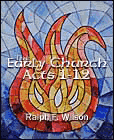 Paperback, PDF, Kindle book formats |
Prayer
Lord, thank you for letting us glimpse the power of Christ to save an incorrigible enemy and turn him into a powerful advocate, for letting us witness through Luke's account the healing of Aeneas and the raising of Dorcas and the resultant mass turning to Christ. Increase our faith. Let us participate with you so that your miracles might help turn this sad world to the joy of Jesus Christ. In his mighty name, we pray. Amen.
Key Verses
"He fell to the ground and heard a voice say
to him, 'Saul, Saul, why do you persecute me?'
'Who are you, Lord?' Saul asked.
'I am Jesus, whom you are persecuting,' he replied. 'Now get up and go into the city, and you will be told what you must do.'" (Acts 9:4-6, NIV)
"The Lord said to Ananias, 'Go! This man is my chosen instrument to carry my name before the Gentiles and their kings and before the people of Israel. I will show him how much he must suffer for my name.'" (Acts 9:15--16, NIV)
"'Aeneas,' Peter said to him, 'Jesus Christ heals you. Get up and take care of your mat.' Immediately Aeneas got up." (Acts 9:34, NIV)
Endnotes
[363] Merrill F. Unger, "Damascus," ISBE 1:852-855.
[364] The phrase "chosen instrument" (NIV, ESV, NRSV) or "chosen vessel" (KJV) is two words. (1) The adjective eklogē means "a special choice, selection, choice, election" from ek-, "out of, from" + legō, "speak" (BDAG 306, 1) . We get our English word "election" from this root word. (2) The noun skeuos refers to "a material object used to meet some need in an occupation or other responsibility," then "a container of any kind, vessel, jar, dish," then figuratively, as here, "a human being exercising a function, instrument, vessel" (BDAG 928, 3).
[365] "Raised havoc" (NIV), "made havoc" (NRSV, ESV), "destroyed" (KJV) is the aorist participle of portheō, "to attack and cause complete destruction, pillage, make havoc of, destroy, annihilate" (BDAG 853). Also in Galatians 1:13, 23. In Acts 8:3 we see a synonym: lymainō.
[366] "Grew more and more powerful" (NIV), "increased all the more in strength" (ESV, cf. KJV), "became increasingly powerful" (NRSV) is the imperfect passive of the verb endunamoō, "to become able to function or do something, become strong" (BDAG 333, 2a).
[367] "Baffled" (NIV), "confounded" (ESV, NRSV, KJV) is the imperfect indicative of the verb syncheō, literally, "pour together," here, figuratively, "to cause dismay, confuse, confound, trouble, stir up" (BDAG 953).
[368] The imperfect accentuates the rapid growth of Saul's power and effectiveness. It didn't wane after a few days, but became more and more powerful with each passing day.
[369] "Proving" is the present active participle of the verb symbibazō, "to present a logical conclusion, demonstrate, prove" (BDAG 957, 3).
[370] "Conspired" (NIV), "plotted" (ESV, NRSV), "took counsel" (KJV) is the aorist indicative of the verb symbouleuō, "to be involved with others in plotting a course of action, consult, plot" (BDAG 957, 2).
[371] For more on this period, his encounter with the apostles and a map of Arabia at the time, see Apostle Paul: Passionate Discipleship (JesusWalk Publications, 2019), Lesson 2 (https://www.jesuswalk.com/paul/02_arabia.htm).
[372] "Speaking boldly" (NIV, NRSV, KJV), "preaching boldly" (ESV) is the verb parrēsiazomai, "to express oneself freely, speak freely, openly, fearlessly" (BDAG 782, 1).
[373] Acts 9:27; 13:46; 14:3; 19:8; Ephesians 6:20
[374] Syzēteō, BDAG 959, 2.
[375] Mark 8:11; 9:14, 16; 12:28.
[376] Eirēnē, BDAG 287-288, 2a; W. Foerster, eirnē, ktl., TDNT 2:406-420.
[377] I realize that in the Greek text these are not parallel grammatically.
[378] "Strengthened" (NIV), "being built up" (ESV, NRSV), "edified" (KJV) is the present participle of oikodomō, is "to build," here with the sense of "to strengthen, build up, make more able" (BDAG 696, 3).
[379] "Encouraged" (NIV), "comfort" (ESV, NRSV, KJV) is the noun paraklēsis. It can have several flavors, depending on the context: "emboldening, encouragement" as well as "comfort, consolation" (BDAG 766, 3).
[380] "Grew in numbers" (NIV), "multiplied" (ESV, KJV), "increased in numbers" (NRSV) is the imperfect passive verb plēthunō, "to cause to become greater in number," here in the passive, "be multiplied, grow, increase" (BDAG 826, 1a).
[381] Ekklēsia, BDAG 304, 3bβ.
[382] Ekklēsia, BDAG 304, 3c. Danker cites 1 Corinthians 12:28; Ephesians 1:22; 3:10, 21; 5:23ff; Colossians 1:18, 24; Philippians 3:6; etc.
[383] "Traveled about the country" (NIV), "went here and there" (ESV, NRSV), "passed throughout all quarters" uses the present middle participle of dierchomai, "to move within or through an area, go (through)" (BDAG 244, 1bα).
[384] W. Ewing and R. K. Harrison, "Lod, Lydda," ISBE 3:150.
[385] "Paralytic" (NIV), "was paralyzed" (ESV, NRSV), "was sick of the palsy" (KJV) is the perfect passive participle of paraluō, "to cause to be feeble, undo, weaken, disable" (BDAG 768). The perfect tense suggests an event which happened, with long term effects to the present. English "palsy" means "paralysis."
[386] "Heals" (NIV, ESV, NRSV), "maketh thee whole" (KJV) is the present middle indicative of iaomai, "to restore someone to health after a physical malady, heal, cure" someone (BDAG 465, 1).
[387] "Make your bed" (ESV, KJV, NRSV), "take care of your mat" (NIV) is the aorist imperative of strōnnumi, "to distribute something over a surface, spread" something, here "make your own bed" (BDAG 949, 1). "Literally, spread thy bed for thyself (dative case), what others for eight years have done for thee" (Robertson, Word Pictures).
[388] "Turned" is the aorist indicative of epistrephō, "to turn to," here, "to change one's mind or course of action, turn back, return," also in Acts 11:21 (BDAG 382, 4a).
[389] Bruce, Acts, p. 211.
[390] A. F. Rainey, "Joppa," ISBE 2:1119; Wikipedia article, "Jaffa." According to Josephus, the harbor at Joppa was inferior to that of Caesarea (Antiquities 15.9.6).
[391] "Always doing" is the imperfect tense of the verb eimi, "to be." The imperfect suggests continued action in the past. "Good deeds" is two words: the noun ergon, "deed, work, action" and the adjective agathos, "good," here, "meeting a high standard of worth and merit, especially in terms of social significance and worth" (BDAG 3-4, 2aβ).
[392] Two words are used: the imperfect of poieō, "to do," with the imperfect suggesting continuous action in the past: and the noun is eleēmosunē, "compassion," here, "exercise of benevolent goodwill, alms, charitable giving" with focus on attitude and action as such (BDAG 315, 1).
[393] "Robes" (NIV), "tunics" (ESV, NRSV), "coats" (KJV) is the plural of chitōn, "tunic, shirt," a garment worn next to the skin by both sexes. Danker notes that "the plural probably does not mean a number of shirts, but clothes generally" (BDAG 1085).
[394] "Garments" (ESV, KJV), "clothing" (NIV, NRSV) is the plural of himation, "clothing, apparel," generally of any garment, but perhaps specifically of outer clothing, "cloak, robe" (BDAG 475, 2).
Copyright © 2025, Ralph F. Wilson. <pastor![]() joyfulheart.com> All rights reserved. A single copy of this article is free. Do not put this on a website. See legal, copyright, and reprint information.
joyfulheart.com> All rights reserved. A single copy of this article is free. Do not put this on a website. See legal, copyright, and reprint information.
 |

|
In-depth Bible study books
You can purchase one of Dr. Wilson's complete Bible studies in PDF, Kindle, or paperback format -- currently 48 books in the JesusWalk Bible Study Series.
Old Testament
- Abraham, Faith of
- Jacob, Life of
- Moses the Reluctant Leader
- Joshua
- Gideon
- David, Life of
- Elijah
- Psalms
- Solomon
- Songs of Ascent (Psalms 120-134)
- Isaiah
- 28 Advent Scriptures (Messianic)
- Daniel
- Rebuild & Renew: Post-Exilic Books
Gospels
- Christmas Incarnation (Mt, Lk)
- Sermon on the Mount (Mt 5-7)
- Luke's Gospel
- John's Gospel
- Seven Last Words of Christ
- Parables
- Jesus and the Kingdom of God
- Resurrection and Easter Faith
- Apostle Peter
Acts
Pauline Epistles
- Romans 5-8 (Christ-Powered Life)
- 1 Corinthians
- 2 Corinthians
- Galatians
- Ephesians
- Philippians
- Colossians, Philemon
- 1 & 2 Thessalonians
- 1 &2 Timothy, Titus
General Epistles
Revelation
Topical

